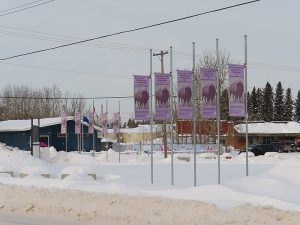The early and repeated suspensions of newly elected Salt River First Nation chief starting in 2022 by the band council were procedurally unfair and even unlawful, a federal court judge in Edmonton has ruled.
Justice Paul Favel peppered his 35-page Salt River decision with terms such as “unreasonable” “unfair” and “arbitrary,” as he granted Chief Toni Heron a judicial review of the band council’s decision to suspend her as chief for 60 days.

A view of Salt River First Nation. (CKLB file photo.)
This after Chief Heron was in office for only seven days.
The original 60-day suspension was renewed at least five times.
Favel stated: “The suspension decision and subsequent suspension decisions were rendered in a procedurally unfair manner.
“The subsequent suspension decisions are, in effect, an unlawful removal of Chief Heron.
Favel noted that a council cannot use a suspension power to effectively remove an elected leader.
“Council has a limited ability to suspend an elected leader, but the ultimate authority to decide whether a Chief should remain in office rests with the membership
“Council has violated its power and exceeded its authority by repeatedly and without justification invoking the 60-day suspension power.”
Favel noted the suspensions had “particularly harsh” consequences for Heron and a decision may be unreasonable “because it effectively removed her from her elected position and she has not been receiving remuneration.
The court ordered the first nation to pay Chief Heron the salary she lost due to the suspensions and a lump sum for legal costs of $12,000 payable.
The latest Salt River drama to be played out in public started following the September 2022 election. Heron was elected chief, while the six councilors were all acclaimed.
It’s not completely clear what is behind the latest dispute, although media reports from

The Salt River Business and Conference Centre. (CKLB file photo.)
that time detail tense differences about how much should have be shared with the band’s membership about a Fire Hall contract the Nation bid in confidence on and other matters.
In 2022, CBC North reported that every band election between 2002 and 2014 resulted in a motion to remove or suspend either the chief, members of the council, or was followed by several resignations.
Many of those matters would then head to federal court.
“We spend millions of dollars on court cases against our own members. Where does it stop?” Heron told CBC.
“Where is the justice to that?” she asked. We’re not here to feed the courts, were not here to feed the lawyers, we’re here for our members.”
In the early 2000s Salt River received $83 million and 414 square kilometres of land when it signed a treaty settlement agreement with Ottawa.





